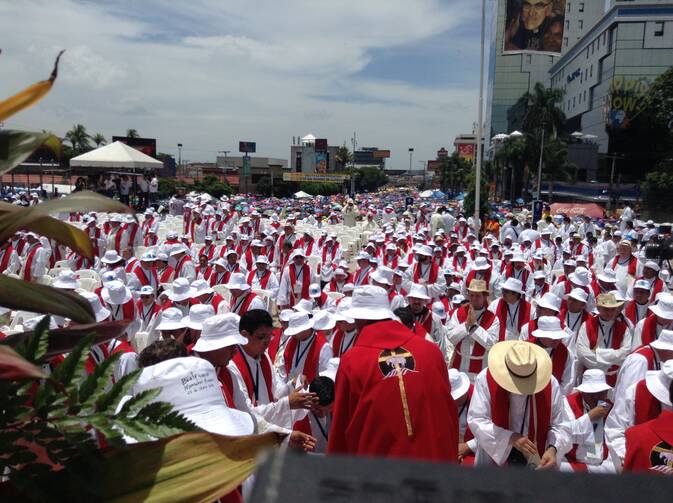If there is any place in need of salvation at this moment, it is the Central American country named after Jesus Christ. Even as it prepared to mark one of the biggest events in its history—the beatification on May 23 of the slain Archbishop Oscar Romero—El Salvador, which in Spanish means “the Savior,” suffered in the midst of one of its most violent periods.
March marked one of the deadliest months in a decade, with 481 people murdered, an average of 16 homicides a day, many committed by the nation’s violent and ubiquitous gangs, said officials from the National Civil Police. Almost as an affront, gang leaders in April said they would provide some momentary respite from the violence as a “gift” to the Salvadoran martyr on the occasion of his beatification.
That means little to people like Lourdes Molina, a mother of three teenage boys who lives each day in fear that her sons will be hurt or worse by the gangs that terrorize the six million people who live in El Salvador. The violence is “unbearable,” she said. The only thing left to hang on to is the divine intervention of Christ or the intercession of the soon-to-be Blessed Oscar Romero, she said.
Though the impending beatification brought an air of festivity to a country with little to celebrate, the long-term outlook for the young people of El Salvador is dim, she said. No matter how many precautions she takes, Molina fears violence will one day come knocking at her door, as it does for many Salvadorans.
Archbishop Romero, too, was a victim of violence, shot down on March 24, 1980, as he celebrated Mass. He was one of the more than 70,000 Salvadorans killed during the country’s armed conflict that lasted from 1979 until 1992. He had pleaded with soldiers the day before to stop killing innocent civilians.
Even after the conflict came to an end, a series of factors—weapons left over from the war, an influx of gang members from the United States and narco-trafficking—over time have contributed to the country’s present state: a designation as one of the most dangerous countries in the world and a threat to pass neighboring Honduras as the most dangerous place on earth that is not in an official war.
Mauro Verzeletti, a Scalibrini priest who preached on Ascension Sunday, May 17, at St. Anthony of Padua Parish in Soyapango, outside San Salvador, invoked Archbishop Romero to help the country move forward. There’s nothing left but to follow the Gospel, to fight for truth, transparency, an end to corruption, extortion and killings, all the things that God calls on people to reject, he said. No one knew this better than Archbishop Romero, who, like Christ, was assassinated, he said.
“Oscar Romero, a martyr, was hated for his faith, as one who loved the poor. He proclaimed the Gospel of our Lord Jesus Christ, and those who proclaim it are hated in this world, persecuted, maligned,” which happened to Archbishop Romero even after he was assassinated, Father Verzeletti said. “But we can’t be fearful, or the devil will creep in,” he added. “The devil manifests itself in the form of injustice, impunity and corruption.” He called on Salvadorans to live with fortitude even in the midst of what seems like a hopeless situation.
“Being Christians doesn’t mean we’ll sit around like Galileans, with our arms crossed looking at the sky,” he said. “Being Christian is to act against the reality of this violence, of these killings, of this evil, of all these many things that prevent us from living with dignity in our society.”
That is what Archbishop Romero and Christ called for, he said.








